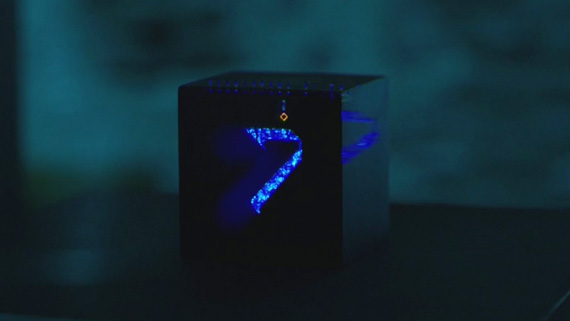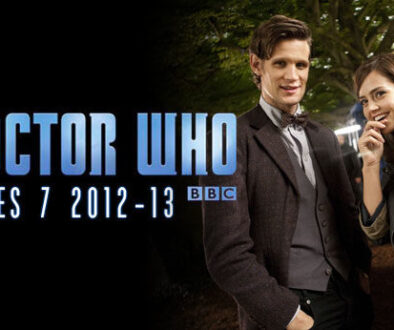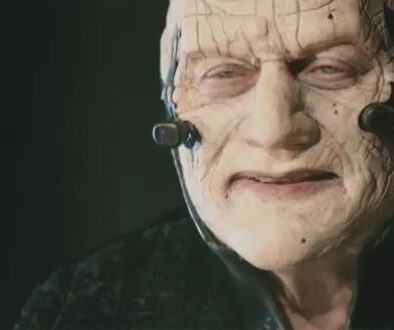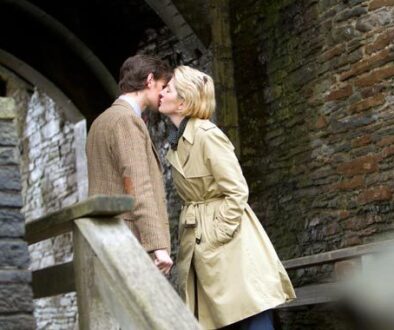The Power of Three Review
Clint Hassell gives his verdict on the fourth episode of Series 7.
In keeping with the episode’s repeated use of the number “7,” I present my top seven reasons for loving “The Power of Three”:
7. The effects

Usually, The Mill and Space Digital design effects that are believable enough to not distract from the narrative, and creative enough to be visually interesting. This week, the two companies outdo themselves by taking the simplest of objects – a small, black cube – and actualize probably my favorite visual effect in all of Who. Because their internal light reflects off their sides like a prism, the cubes transcend mere special effects and achieve the feel of fully-realized objects.
6. The music
Aside from the familiar leitmotifs – “I Am the Doctor” or “Little Amy,” for example – I rarely notice Murray Gold’s music, which effectively enhances the story without drawing unnecessary attention to itself. However, the music underscoring the nighttime scene where the Doctor confronts Amy on her desire to stop traveling with him is the first in this series that will make me buy a soundtrack album.
5. This image:

“The Power of Three” brought so many nods to the show’s history: Amy and Rory eating fish fingers and custard. K-9. The Zygons! (Sure, they weren’t seen, but, just knowing that they were there, and that Amy and Rory got to fight them, was good enough for the fanboy in me.)
The scene where the Doctor asks to stay with Amy and Rory – ostensibly to watch the cubes, but admittedly because he misses the two – is both endearing and visually arresting, as the Christmas lights flicker in the background. Amy turning to hide a smile is a character moment earned after two-and-a-half series on the show.
4. The justification of both the Ponds’ continued presence and the Doctor’s personality

Classic-era companions usually traveled with the Doctor for one continuous trip, before disappearing from the show’s narrative forever – the major exceptions being Tegan and recurring character Brigadier Lethbridge-Stewart (whose daughter not coincidentally features in “The Power of Three”). Though many revived-era companions have continued to reappear, examination of post-companion life has primarily been relegated to The Sarah Jane Adventures and Torchwood, with only “School Reunion” dealing directly with the subject.
While the Ponds’ presence in Series 7 has given us several nice moments (such as Amy and Rory recognizing the Silurians), they’ve served little more than standard companion roles of “endangered” and/or “expositor,” thus far. Writer Chris Chibnall corrects this by exploring Amy and Rory’s difficulty in returning home to the seemingly-mundane “adventures” of maintaining a refrigerator full of non-expired food, substantial friendships, and full-time employment, after traveling in space and time. It is extremely gratifying to see that, though they cannot resist the excitement of sporadic trips within the TARDIS, Rory and Amy see the value in establishing roots and in experiencing wonders less ephemeral than the Doctor’s “forever growing and shrinking and creating and destroying” universe.
Contrast that to the extreme immaturity displayed by the Doctor in “The Power of Three.” Much like a four-year-old, developmentally unable to see things from another’s perspective, the Doctor is surprised that Rory has a job, or that Rory would consider his life apart from the Doctor to be equally important. The Doctor seems to accept Rory’s assertion, but glares angrily after the Ponds, as they turn to leave the TARDIS. In the Ponds’ lounge, The Doctor demonstrates that he is incapable of sitting still and focusing on one task, before throwing a literal tantrum:
Rory: “You said we had to ‘be patient.’”
The Doctor: “Yes, yes – YOU! YOU! I HATE being patient!”
The Doctor seems to admire the Ponds when he mentions that they are “grown up,” yet there’s a detachment in his statement. In growing up, Any and Rory have become less like the Doctor, not more. The message is reinforced as the Doctor gifts Amy and Rory with a romantic night, away from the constant threat of the cubes. The scene is beautifully apt as it ties into the theme of the Ponds needing to get away from the Doctor to do – and note my phrasing – “adult” activities.
The episode brings the motif of Doctor-as-child full-circle: not only are Amy and Rory the Doctor’s parents by way of his marriage to River Song, but he admits to Amy that her face is literally imprinted upon him, like a baby chick to its mother hen. Suddenly, Eleven’s portrayal as immature and selfish have an in-narrative reason: by traveling with the Ponds, the Doctor is, in effect, still living at home with Mum and Dad. We’ve seen Amy and Rory mature to the point that they choose to leave the Doctor; hopefully, their demise in “The Angels Take Manhattan” will be the catalyst for a maturing of Eleven’s character as well.
3. Kate Stewart

The moment Kate Stewart appeared – masculine, yet warm, her hands in her pockets, her delivery both gruff and gentlemanly – it was evident she was the Brig’s daughter. The Doctor’s quick line, affirming her dad’s identity, put a lump in my throat.
Kate’s exit was too quick for her not to reappear. She is the best addition to the Doctor Who cast in years. Not only does she represent Who’s history, giving her a legitimate reason for appearing (as opposed to the much-used-as-of-late, “I’ve had an off-screen adventure with the Doctor”), she’s also a character of substance that fulfills a purpose within the show‘s narrative, as UNIT can be used to fill the void left by Torchwood, when Who adventures get sciencey-wiencey.
2. RORY’S IN HIS UNDERWEAR!

(What – you thought this was going to be reason #1?)
We’ve seen shirtless Rory, the Doctor kissing Rory, and now pants-less Rory. “Has someone been peeking at my Christmas list?”
Bonus points for the shirtless Doctor scene in the episode’s third act.
1. The sophistication of Brian Williams’ backstory

While “Dinosaurs on a Spaceship” hinted that Brian was widowed – he takes up traveling on a whim, appearing alone in the resulting photographs – “The Power of Three” demonstrates how the loss of Mrs. Williams has affected Brian. The excitement Brian shows in finally having a purpose on which to focus, and how dutifully he accomplishes his rather mundane tasks telegraphs the loss he has been feeling, and adds a haunting subtext not only to next week’s “The Angels Take Manhattan,” but also to his first appearance in “Dinosaurs on a Spaceship.” Brian’s line, “He doesn’t know how lucky he is to have you,” becomes particularly poignant, and suddenly, it is easy to imagine the great loss that drove Brian to crave the familiarity of his own home, to be anxious when traveling, and to always be prepared for any event with a pocketful of useful items. Chibnall clearly had Brian’s entire backstory in mind when writing “Dinosaurs on a Spaceship” and “The Power of Three,” and scattered snippets of it between both episodes, giving the audience the chance to discover layers within this new, endearing character.








